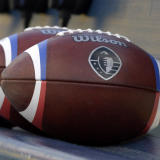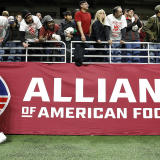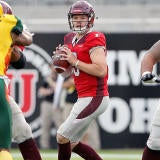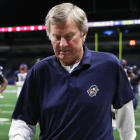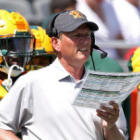Charlie Ebersol, the Alliance of American Football's CEO, promised that his new league of pro football wouldn't be all that different from what fans saw in the NFL on Sundays in the fall.
There's a caveat in that statement, of course. The AAF wouldn't be exactly like the NFL in terms of the on-field product, because there is no substitute for the NFL. Ebersol and co-founder Bill Polian instead stressed that their league would be what the original XFL was not: real football for football people, by football people.
With one week in the books, that description was about right. The AAF does some things differently than the NFL -- some of which are very good, like replay transparency -- but overall the first four games felt like watching any other football game. And if you're starved for more football, then this is a way to satisfy that need while the AAF does what it wants to do: develop players to get back into the NFL.
Maybe the No. 1 question about the AAF as we exit the first week was whether this league will survive or join the graveyard of past short-lived pro football leagues. It's tough to say for sure right now, but the overall impression is that there's serious potential.
On a team level, it's a little easier to make judgments because the results are tangible. We can see them with our own eyes. That doesn't mean these judgments will be correct in a couple of weeks, but at least now there's something observable to go off. With that in mind, here are five takeaways from Week 1 of the inaugural AAF season -- plus my weekly MVP vote.
Maybe Orlando really is that good
There are snap judgments, and then there's watching Orlando house Atlanta while Steve Spurrier calls the Philly Special. What a first impression the Apollos made in a 40-6 victory. So now we ask: Was Orlando that good ... or is Atlanta that bad? The less-sexy take is that the answer lies somewhere in the middle, but the Apollos looked awfully skilled. That could be the theme for this team as the season progresses.
One thing that I walked away impressed by when I watched Orlando in practice last month was the overall sense of team speed. Most of these guys, of course, were on either a NFL or CFL roster in the past 18 months. They can play -- and just as important, they can fly around the field. While every team has that speed, Orlando certainly seems to know how to use it. If the Apollos were a sports car, Spurrier's play calling was premium gas. Week 1 was most definitely not vanilla for the Head Ball Coach, who coached his first game in more than three years. He was calling deep throws to Jalin Marshall and throwback passes to quarterback Garrett Gilbert. He was wholly unafraid of the weapons at his disposal and it showed.
THE ORLANDO SPECIAL! pic.twitter.com/BKztnVXWO1
— CBS Sports (@CBSSports) February 10, 2019
San Antonio's defense looks legit
It could just be that San Diego's offensive line is porous. To be fair, pretty much everyone I spoke with during and after training camp had at least some concerns about their offensive lines. That makes sense. These rosters came together a month ago and the offensive line is usually the last unit to come together because, well, it has to play as a unit. That takes time, reps and chemistry and a month doesn't always cut it. So it wasn't a huge surprise that San Diego's offensive line looked shaky in a 15-6 loss to the Commanders.
But, lord, did San Antonio's defense make a statement: 5.2 yards per play allowed, 3-of-13 on third downs, zero red-zone points, three interceptions, 10 quarterback hurries, six sacks, one forced fumble and a partridge in a pear tree. Shaan Washington's semi-literal beheading of Fleet quarterback Mike Bercovici was not only an incredible individual play, it was the viral moment that truly launched the AAF season.
Shaan Washington can BRING IT. pic.twitter.com/7VqYNk3DwD
— CBS Sports (@CBSSports) February 10, 2019
Granted, that's pretty rough pass protection from San Diego. The tight end put a little block on Washington as he ran his route and the running back didn't pick him up at all. Someone missed an assignment and Bercovici paid the price. And of the three picks San Antonio's defense had, the most important was Zack Sanchez's game-sealing INT, which was a perfect display of turning your head around, tracking the ball and making a play. It was exactly how you coach 'em up. This was a fast, well-coached defense on display.
The biggest interception in @aafcommanders history!
— CBS Sports (@CBSSports) February 10, 2019
What a play by Zack Sanchez! pic.twitter.com/h0OYbyOtPk
QB battle already brewing in San Diego?
Fleet coach Mike Martz is one of the most gifted offensive minds football has ever seen, but he has his work cut out for him with this team's quarterback situation. Bercovici didn't exactly inspire a lot of confidence in moving the ball (176 yards, two interceptions) but what can you realistically expect when he's either on the run or on his back practically every other play? In relief, Phillip Nelson went 5-of-10 for 68 yards. Bercovici and Nelson engaged in a pretty heated battle in training camp, and at one point Bercovici had to essentially regain the starting job. It's not uncommon for position battles to continue into the season given that everything is still so new, but this one could continue for some time in Saturday night's performance was any indication. If nothing else, the Fleet probably miss Josh Johnson right about now after he was picked up by Washington late last year.
Memphis is alarmingly limited offensively
That's both an understatement and a legitimate concern for the Express moving forward. Even though most offenses around the Alliance were working out the kinks in Week 1, none of them put up a goose egg like Mike Singletary's team. The final score of 26-0 in a loss to the Iron almost didn't do the lopsided game justice. At least Atlanta got boat raced by what appears to be a playoff contender in Orlando.
Memphis can spin itself a run-first offense, but that's because it had zero passing game to speak of and the most successful play of the day -- a trick pass out of the Wildcat formation -- was called back for a penalty. Starting quarterback Christian Hackenberg (10-of-23 for 67 yards and a pick) is going to get most of the blame because 1) he's the starting quarterback and 2) he had a disappointing career in the NFL and for much of his time at Penn State. He's a meme-able target, and it didn't help that after getting a Trent Richardson fumble in the third quarter, Singletary opted to run the ball, sometimes completely taking the snap out of Hackenberg's hands, instead of trying to spark the offense with a deep shot.
IRON FOOTBALL
— CBS Sports Network (@CBSSportsNet) February 10, 2019
Christian Hackenberg is picked off, and the @aafiron get great field position. pic.twitter.com/Lt3xfA96BO
However, Memphis' problems appear much deeper than quarterback. The offensive line looks like it needs more time, though that's a common theme for most teams at this early stage. More pressingly, there might not be a consistent deep threat in the receiving corps. Kayaune Ross, a 6-foot-6 target out of Kentucky, was mentioned as a name to watch coming out of training camp, but he had zero catches. Pig Howard was productive, but is he a viable option to stretch the field? To Birmingham's credit, the back end of that defense looks like a shutdown unit. However, it also helps when there's no concern for a deep threat and you can bring an extra defender into the box.
Is home field advantage a huge thing?
Week 1 was bad for road teams. Not only did all four lose, but every home team covered, usually convincingly. Granted, every line was within a touchdown and oddsmakers are still figuring out how to play this. But this wasn't a good opening weekend for competitiveness, which is a whole other talking point in and of itself. Arguably, the team that played best on the road was Salt Lake City -- and the Stallions lost to the Hotshots 38-22.
That begs a question: how much is home field advantage really worth in the AAF? Your normal line will give the home team -3. Maybe in time that holds consistent here, but what if it is worth more?
The other possibility is more coincidental. What if most of the Alliance's lower-tiered teams just so happened to play on the road in Week 1? First impressions being what they are, Memphis, Atlanta and San Diego appear to be the three teams with the most concerns. That can, and probably will, change, but two of those aforementioned three lost by a combined score of 66-6. Of course, that perception works the other way, too. What if teams like Arizona, Orlando and Birmingham are just that good?
These questions will be answered in time, but for now there are two focal points emerging with how these games are playing out. The first is the scoreboard disparity -- remember, the AAF has promoted evenly allocated talent across all eight teams -- and the second is whether these lines need to be adjusted, and if so, by how much?
Player of the Week
Apollos linebacker Terence Garvin: With the way the Alliance views offense, there will be plenty of chances for this award to go someone on that side of the ball. This time, though, a defensive player earned it. Garvin had 10 tackles and two interceptions, including a pick-six for the Apollos. Plus, it's nice to highlight a guy who represents what the AAF stands for: an NFL journeyman who's trying to make the most of this opportunity to develop and get back into the league. Garvin's off to a good start.


